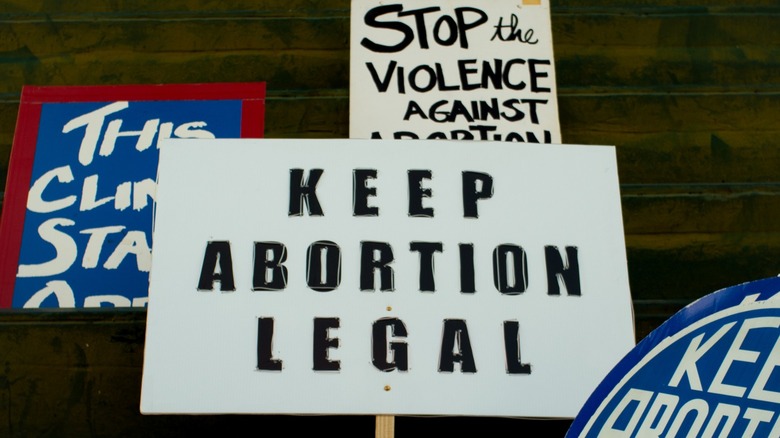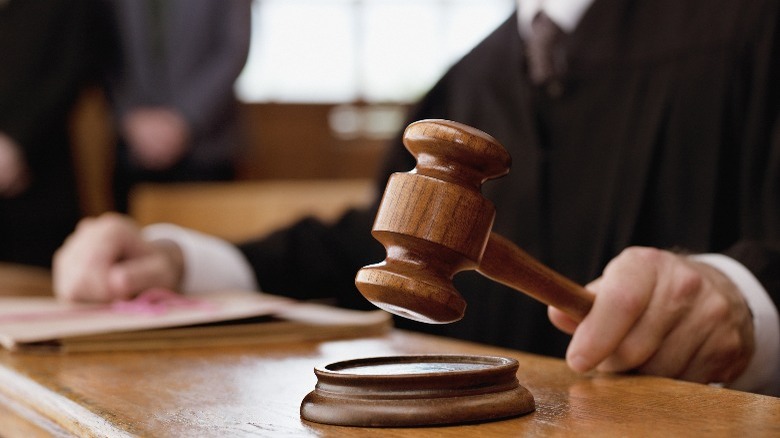Florida's Proposed 6-Week Abortion Ban Has An Exceptionally Cruel Disclaimer For Sexual Assault Survivors
Florida has proposed a 6-week abortion ban, one that would restrict even further the limits on the procedure. A 15-week ban in the state has been in place since 2022. The 15-week ban has made Florida a "refuge" for those in the Southeastern states, where its neighboring state of Georgia imposes a 6-week ban, and Alabama, Mississippi, and Louisiana enforce complete bans on abortion, according to a map created by the Center for Reproductive Rights. Should the bill pass — and there is little chance it will not — people in the state of Florida, and its surrounding states, would be impacted.
The Florida bill, SB 300, like other bills that have banned or seek to ban abortion, does provide an exception in the case of rape or incest, but not after 15 weeks. Even still, there's a catch: "At the time the woman schedules or arrives for her appointment to obtain the abortion, she must provide a copy of a restraining order, police report, medical record, or other court order or documentation providing evidence that she is obtaining the termination of pregnancy because she is a victim of rape or incest," a portion of SB 300 reads. This measure likely exists so that people will not attempt to "take advantage" of the extra time frame for receiving an abortion for those who meet the criteria, though it's hard to take advantage of a law that would take away anybody's rights. Instead, this provision will force survivors of sexual assault to clear even more hurdles before finally receiving the care they need.
The burden of proof falls on the victim
Sexual assault cases are known for going underreported and almost never end in a conviction. According to the Rape, Abuse & Incest National Network (RAINN), about one-third of sexual assaults are reported to law enforcement, and of those, just 2.5% see the perpetrator jailed. There are a vast number of reasons why someone might not report the assault. They might fear retaliation from the person who harmed them, for example, or may feel that they would not receive adequate assistance from police. According to Florida law, the burden of proof falls upon the survivor of the assault to convince a judge that it happened in the first place. And since sexual assaults often take place without witnesses, how credible the parties appear becomes significant. After all, who is to say what constitutes as proof?
We know that women's stories have been historically discounted — hence the slogan and hashtag #BelieveWomen that was born out of the MeToo movement. Florida's proposed ban on abortion, with the exception of rape or incest where there is documentation of it, fails to account for each sexual assault survivor who did not, or could not, report their assaults.
It suggests survivors are to blame for their assault
The stigma surrounding sexual assault is also immense. According to Resilience, an organization that advocates for survivors of sexual assault, survivors often feel shame around their assaults, as though they are somehow responsible for what happened to them. The broader culture of blaming and shaming that survivors face can also contribute to them not coming forward to seek assistance about their assaults. The bill also ensures that state funds will not go toward providing abortions for people who need them. Now, couple this stigma with the stigma of seeking an abortion in a country that is banning them, and the burden of seeking care seems both cruel and increasingly out of reach. People are made to carry the burden of their assaults, the burden of seeking an abortion, and, in a literal sense, carry an unwanted pregnancy should they not be able to have an abortion.
However, another Florida law enables people to track their sexual assault evidence collection kits, after thousands had not been tested or logged (per WINK). The kits will be available through a database that survivors can monitor, in an attempt to give them some semblance of control over their bodies and cases in spite of so much being taken from them.


